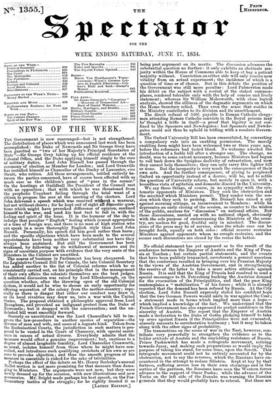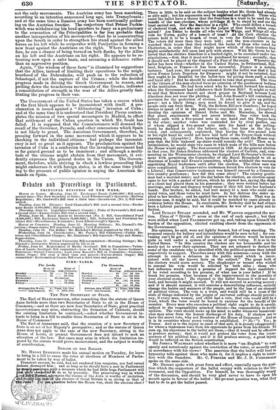No official statement has yet appeared as to the result
of the conference between the Emperor of Austria and the King of Prus- sia at Teschen ; but certain partial statements, and the events that have been publicly transacted, corroborate a general assertion that the conference resulted in bringing over his Prussian Majesty to the views of the Austrian Government, and in strengthening the resolve of the latter to take a more active attitude against Russia. It is said that the King of Prussia had resolved to send a special messenger to St. Petersburg backing the Austrian demand for the evacuation of the Principalities, and that the poor King contemplates a " mobilization " of his forces ; while it is already reported that the demand has been refused by Russia. At the City election, Lord John Russell expressly stated his confident hope that the two German Powers would unite in war against the Czar; a statement made in terms which implied more than a hope— which implied a knowledge of the fact. We understand that the French Government has also expressed its perfect confidence in the sincerity of Austria. The report that the Emperor of Austria made a declaration to the Duke of Gotha pledging himself to take up arms against Russia if the Principalities were not evacuated, scarcely amounts to corroborative testimony ; but it may be taken along with the other signs of probability.
The transactions on the scene of war in the East, however, con- tribute very powerfully to strengthen the evidence as to the bolder attitude of Austria and the unyielding resistance of Russia. Prince Paskiewitch has made a retrograde movement, retiring towards Jassy, and making such preparations as would imply the purpose of taking his stand, for some time, upon the Sereth. This retrograde movement could not be entirely accounted for by the obstruction, not to say the reverses, which the Russians have en- countered in the attempt to reduce Silistria. Kept at bay by that fortress, suffering severe loss in their own stormings and in the sorties of the garrison, the Russians have seen the Western forces advance to the support of Omar Pasha; while the advance of the Turks on the left side of the Danube was warning the Russian generals that they would probably have to retreat. But these are not the only movements. The Austrian army has been marching, according to an intention announced long agn, into Transylvania ; and at the same time a Russian army has been continually gather- ing on the Austrian frontier. The conjecture that Prince Paskie- witoh was withdrawing his head-quarters to Jassy as a preliminary to the evacuation of the Principalities is far less probable than another interpretation of his movements-that he is concentrating upon the Sereth in order to strengthen his stand against the allied forces on his left while he cooperates with Panijutine in forming a new front against the Austrians on the right. Where he was be- fore, he ran a chance of being turned on both flanks, by the Allies on his left and the Austrians on his right. He appears to be re- treating now upon a safer basis, and assuming a defensive rather than an aggressive position. Again, "the wisdom of these facts" is illumined by suggestions that the Allies, instead of limiting their operations to the neigh- bourhood of the Dobrudscha, will push on to the reduction of Sebastopol, if not the capture of the Crimea ; while the decided progress made in driving the Greek Government to reason, and putting down the treacherous movements of the Greeks, indicates a consolidation of strength in the rear of the Allies greatly faci- litating the progress in their van.



























 Previous page
Previous page